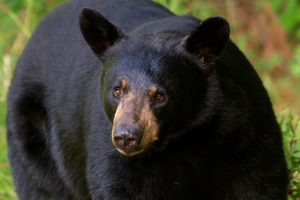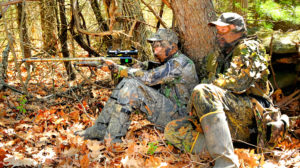According to DFW Western District Supervisor Andrew Madden, as of March 1, 2018 the Western District has had three reports of bears attacking livestock, in two cases killing a sheep and a goat. In the third case, a llama was attacked but got it away with minimal harm. The attacks took place in the towns of Monterey, Blandford and West Stockbridge.
Madden noted that in all three cases residents had seen bears regularly but continued feeding birds.
Bears are pretty hungry this time of year. With this lingering winter, succulent vegetation
such as skunk cabbage is late arriving. We would be wise to keep a close eye on our pets and animals, and for goodness sake, don’t invite the bears with bird seeds, suet and garbage. The following are some suggestions for farmers and others to help avoid encounters with bears:
Protect livestock
Avoid pasturing animals in remote areas or nearby heavy wooded cover or travel areas that bears might use. Whenever possible, pen livestock in or near the barn at night, especially pregnant females and those with small young. Avoid field birthing if possible. Do not leave carcasses of dead animals exposed in fields, pastures, or nearby areas. Consider the use of guard animals. Keep livestock feed in secured outbuildings protected by electric fencing or in bear-proof containers.
Protect bees and chickens
Use electric fencing to safeguard hives and coops. Electric fences are most effective when put up and continuously charged before the first damage occurs. Keep open, mowed areas on all sides of hives and coops and do not locate hives or coops in abandoned areas or close to brushy, overgrown areas.
Protect crops and orchards
Temporary electric fencing may be used to protect corn and other crops. Seven-strand slanted non-electric fences have been used to keep bears out of orchards. Contact local bear hunters for the early September bear season to hunt the fields.
If you have a second home owner neighbor who has not yet arrived in the Berkshires, you might want to share the following information with them:
Bird Feeders
MassWildlife recommends that if you live in an area with bears, it is best to avoid bird feeders altogether. Bears finding a bird feeder, bird seed, corn or other bird food will often revisit that site. Bird feeders draw bears closer to people, resulting in bears losing their fear of people. This process is called habituation. It’s not safe for bears or people to be close to one another.
If you choose to put out feeders, doing so in the winter when bears are denned decreases the chances of a bear coming to your feeder. In general, most bears are denned from mid-December through February. Although most bears in Massachusetts enter winter dens, MassWildlife biologists have tracked bears that remained active for some or all of the winter if food is available. It is important that you remove the entire feeder at the first sign of bear activity.
Many wild animals are attracted to bird feeders including wild turkeys and coyotes. Since bird feeders attract small mammals like squirrels, they can also attract animals like fishers and bobcats who prey upon the smaller animals.
For those people who enjoy birds in their yards, MassWildlife suggests growing native plants, shrubs, and trees to attract birds. Adding a water feature is a big draw for birds. Taking these actions may increase the diversity of birds you see and will prevent the unnatural feeding of bears and other kinds of neighborhood wildlife. Some bears have learned to empty bird feeders without destroying the feeder. Do not continue to fill a feeder. Do not leave empty feeders out because residual smell and the sight of feeders can still attract bears.
Pets
Pet food is a tasty treat for bears so don’t leave pet food outdoors. The presence of a dog could trigger a bear to be aggressive. Keep dogs leashed and never let dogs chase or interact with bears. Check your yard for bears before letting your dog out. If you encounter a bear while with your dog, back away slowly and leave the area.
Garbage
Store all garbage in closed containers in a garage or outbuilding. Do not leave your garbage barrels outside overnight. Rather, put them by the roadside before pickup. Use of double bags or sprinkling with ammonia will help reduce odors. Bears and other wild and domestic animals will tip cans and scatter garbage. Smelly cans may attract bears even if there isn’t anything in them, so store garbage cans inside.
Compost responsibly. Do not throw meat scraps, greasy, oily or sweet materials in your compost pile. These kinds of food attract bears and other animals.
Bear-proof garbage cans may be available from municipalities or waste management contractors. In communities where bears are more common, bear-proof dumpsters are recommended for apartments, condos and campgrounds.
Clean greasy barbecues and grills after each use. Do not leave food scraps, grease containers or spilled grease in your yard.
If you see a bear in your neighborhood
A bear’s first response to something unusual is to leave. If a bear is feeding in an area where it doesn’t belong, such as your yard, on a porch, or in a dumpster, MassWildlife recommends you step outside, yell, and make lots of noise. The bear will usually leave—accompanied by its young. Habituated bears may ignore minor harassment. If you continue to see bears, check your property and remove any potential food sources.
In the Woods
Black bears are usually wary of people. Normal trail noise will alert bears to your presence and they will often disappear before you see them. If you see a bear, it may not immediately recognize you as a human and may be curious until it scents you. Make the animal aware of your presence by clapping, talking, or making other sounds while slowly backing away. Do not approach bears or intrude between a female bear and her cubs. Keep dogs leashed and stay a respectful distance away.
While Camping
MassWildlife recommends that you don’t cook, eat, or store food in or next to your tent or camp trailer where odors may linger. Sleep as far away from food storage and preparation areas as possible. Do not dispose of food scraps, grease, or other edibles in your campfire. These materials may not completely burn. Also, the scent of burned food may attract bears.
Store food in bear-proof containers or hang it high on sturdy poles or on wires strung between two trees. Food should hang at least 10 feet off the ground and 4 feet off the base of the truck. Don’t feed bears or leave food items or coolers out when away from the campsite. Use caution if storing food in your vehicle. Some bears may be able to break a window to gain entry. Even if unsuccessful, the bear’s attempts may damage your vehicle.
Store toiletries safely with your food. The scent and use of perfumes and colognes may attract bears. Stay at campgrounds that are clean, use “bear boxes” for safe food storage and dispose of garbage in bear-proof dumpsters. While hiking, normal trail noise will alert bears to your presence and prompt them to move without being noticed.
Spread the word about how to avoid conflicts with bears by sharing these tips with others.
Black bears are important and valuable mammals in Massachusetts. They are big game mammals for which regulated hunting seasons and a management program have been established.
Be River Smart!
No, I’m not referring to smart river fishing or river paddling. Heck, you don’t even have to go near a river to be river smart. The Housatonic River Association (HVA) folks are encouraging everyone to “Be River Smart!” in a different way.
According to Allison Dixon, HVA Berkshire Outreach Manager, polluted stormwater runoff is the number one threat to the water quality of our rivers and lakes today. Yet, we can all be part of the solution. Just get River Smart! Understanding the issue is the first step and then being mindful and maybe adjusting of some of our everyday behaviors is the next and most crucial step.
As Dixon points out, we all learned as kids about the water cycle – when rain falls or snow and ice melt, it either soaks into the ground or evaporates. What we probably didn’t learn is that when rain fall meets hard surfaces like roofs, paved parking lots, streets and driveways, it flows as runoff into the storm drains and asphalted channels into the nearest river or lake.
By the time it reaches that water body it is polluted stormwater runoff. Stormwater runoff picks up fluids that leak from cars such as motor oil, litter, pet waste, fertilizer, pesticides, sand and salt and more from the ground. This runoff contaminates the water raising bacteria levels and compromising the integrity of the ecosystem and the health of the aquatic life in all streams of all of our watersheds in Berkshire County.
Each one of us contributes to this source of pollution and each one of us can make a difference. Pick up that pet waste and throw it in the trash, identify and fix those vehicle leaks quickly, switch to organic lawn care and wash that car on the lawn or at a car wash.
For more information on how to be river smart, contact HVA at 413-298-7024 or email Alison Dixon, HVA’s Berkshire Outreach Manager at adixon@hvatoday.org
Trout Stockings
The following local waters were scheduled to be stocked with trout last week but, as Deb Lipa, Clerk for the Western District DFW noted, the water levels/conditions are crazy so there may have been changes and further updates after this list was prepared: Clesson Brook in Ashfield and Buckland, South River in Ashfield, Swift River in Cummington, Ashfield and Goshen; Walker Brook in Becket and Chester, West Branch Brook in Chesterfield, East Branch of the Westfield River in Cummington, Chesterfield and Huntington; Stones Brook in Goshen, West Brook in Great Barrington, Little River in Worthington and Huntington, Greenwater Brook in Lee, Goose Pond Brook in Tyringham and Lee, Beartown and West Brooks in Lee, Goose Pond in Lee, Hop Brook in Lee and Tyringham, Factory Brook in Middlefield, Konkapot River in Monterey, New Marlborough and Sheffield; Lake Buel in Monterey, Mill Brook in Plainfield, Richmond Pond in Richmond, Buck and Clam Rivers in Sandisfield, Stockbridge Bowl and Larrywaug Brook in Stockbridge, Depot Brook in Washington, West Brook in Windsor and Bronson and West Branch Brooks in Worthington.
Spring Turkey Hunting
Next Saturday, April 28, the 2018 Youth Turkey Hunt day takes place in Wildlife Management Zones 1-13. That is a special day set aside for youths aged 12 to 17. This hunt, developed through a partnership with the National Wild Turkey Federation, allows for a mentored hunt. Hopefully, the youths paid attention and successfully completed the pre-hunt workshop and received the special permits.
Hey youngsters, get to bed early Friday night for the spring season begins ½ hour before sunrise, which is around 5:15 am, and you should be in your hunting spot by then on Saturday morning. Good luck and have a safe and enjoyable hunt. Hopefully, the weather will be nice
Incidentally, the regular spring turkey hunting season opens on Monday, April 30 and runs through May 26.
